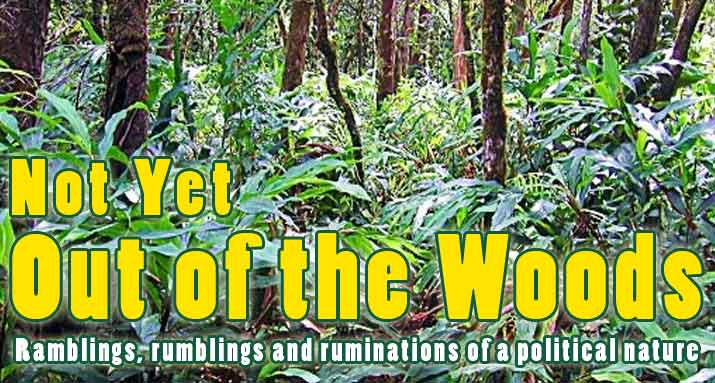In the search for reasons to explain the LibDem humbling at the polls in last weeks elections a 'long-brewing' identity crisis has been forced to the surface, according to James Langdale.
For years, he says, the party has benefitted from attracting a wide variety of support, "many of whom have had vastly differing ideas of what the party is about and for."
For some it was a protest party (think Iraq and tuition fees) and for others it was a single-issue party (civil liberties and constitutional reform). Then there are the 'respectable centrists' who can be swayed with inducements.
So when it came to the crunch and a real decision had to be made - in this case for Nick Clegg to take the party into coalition - it was almost inevitable that much of the half-hearted next-best support would evaporate when faced with the reality of a programme for government.
Even before the general election there were plenty of people willing to express their wishes for a return to two-party politics with a split in LibDem support.
First there was the libertarian wave who abhorred any restraint on personal freedom, even if state impositions were to be used to the lighten economic restrictions of the less fortunate and vulnerable members of society and this could increase the overall sum total of freedom. Then a deep-rooted class identity attempted to cleave open differences between activists and the leadership. Both focussed their attacks on the LibDems, but only had limited success in peeling off support.
Neil Stockley addressed these points at the turn of the year in an excellent and detailed post. He points to various vague descriptions of the LibDems as the 'nicest' party, with 'decent' people, but whose policies 'don't really add up'. Despite a boost to the party's credentials by taking on the responsibility of power "the public is finding it ever harder to get a handle on [the party]."
All in all the LibDem identity is somewhat fuzzy, he suggests, and somewhat presciently states that this in itself presents real risks for the party's future election hopes. Nick Clegg faces an uphill challenge in creating a distinctive narrative to tell the LibDem story which the public can engage with.
So just prior to last Thursday, what do we find?
The redoubtable LibDem Voice publishes confirmation of exactly the split personality which goes to the heart of the matter. According to an internal poll of members own description of their political identity there seems to be little agreement on who they are, other than being 'liberal' (and even that isn't unanimous).
Quite clearly the party leadership needs to pin their colours to the mast more uneqivocally - but in ways and on subjects which can become rallying points around which to unify.
Nick Clegg has been successful on many different issues, from the Gurkhas to the day-to-day practise of coalition, but it is difficult to see a single thread running through all of it. And until he is able to start knitting together all these ideas into a semblence of ideology all the effort which has gone into reaching this point will unravel in accusations of a stitch-up.
When he was first elected leader I was optimistic that the party membership would finally be able to overcome their old SDP/Liberal party differences, but although the divide between social/modern liberal and economic/classical liberal factions is not so riven it hasn't yet transformed into a clearly defined liberal and democratic identity for the LibDem party: the LibDem story has yet to be fully told.
In some ways the split personality of the LibDems is less of a problem than might be imagined, provided it can be embraced as the source of the creative and imaginitive dynamic (though this isn't the natural default position of the majority of politically conscious voters and commentators).
Because the traditional criticism of democracy from classical Greece through to the modern revolutionary period was always that divergent trends mitigated against unity and therefore that in-fighting descended into rampant disorder, it was argued that the democratic impulse should be suppressed. However the development of an effective system of checks and balances to restrain excessive influences has been achieved through the integration of greater representative diversity at official level.
This means the modern political system can be largely self-moderating and requires less top-down intervention to institute needed reforms, making it much more stable as a result, and thereby stimulates the renewed desire for expression.
We may still have a monarch, but the constitutional underpinning of the crown prevents rule according to whim both by any ambitious royalist or jumped-up parliamentarian. Regular elections provide a legitimate mandate for decision-making, and prevent mob-rule at the same time.
The simple existence of such institutional counterweights increases the social discourse to enable more accurate, relevant and timely analysis.
And it in is this form of liberal, open democracy which Nick Clegg should reaffirm his faith - because Liberal Democrats are neither one thing nor the other, not left-wing or right-wing, but something altogether completely different...
The LibDem approach to politics is a point of distinction.
Elsewhere Bruce Anderson makes some interesting points about rediscovering conviction in order to renew one's political fortunes, although he cannot see beyond his own biased Europhobia to expose his own 'respectable centrism' by describing Clegg's supporters with the unbridled zeal of a convert as "a strange coalition of political obsessives" - like he thinks there's something wrong in being aware of the world around you!
Nevertheless I find it difficult to disagree with his rejection of rejectionism - as he says, to survive as a serious political force, you need to work out what you believe in: "negatives are not enough." And in the aftermath of such black and white election results thoughts must turn to survival.

No comments:
Post a Comment